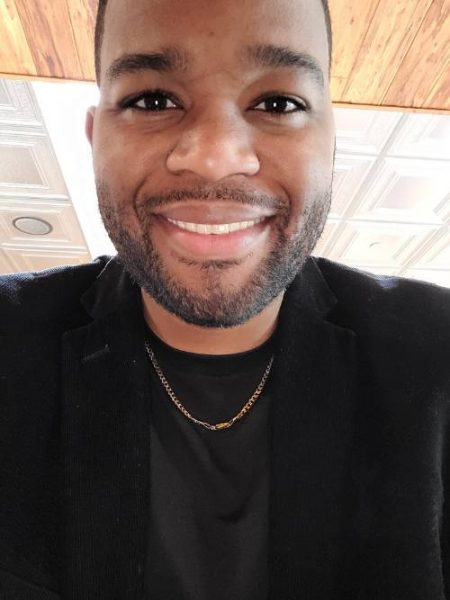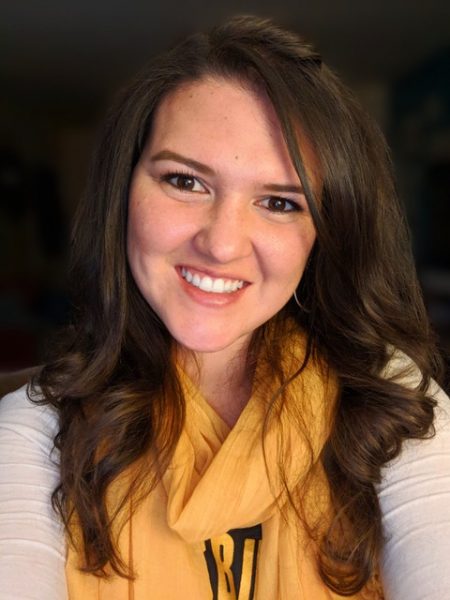By Jenna Somers
Assistant Professors of Psychology and Human Development Deon Benton and Cristina Zepeda joined the Department of Psychology and Human Development at Vanderbilt Peabody College of education and human development this fall. Benton comes to Vanderbilt from Swarthmore College, where he was a visiting assistant professor of psychology. He earned his doctorate in developmental psychology from Carnegie Mellon University. Zepeda was previously a postdoctoral research associate at Washington University in St. Louis. She earned her doctorate in cognitive psychology from the University of Pittsburgh.
Deon Benton
From a young age, Deon Benton loved science, but he never envisioned as a child that he would one day become a scientist, mainly because there weren’t any in his family and he didn’t know what becoming one required.
Not until Benton got to college did he see science as a career opportunity. He joined two different labs in his freshman year, initially unsure about what he wanted to study long term.

“One lab studied bees and the other babies,” Benton said. “I quickly realized that cutting open the brains of bees was not nearly as interesting as studying the complex, rapidly evolving brains of babies.”
Now, Benton directs his own lab at Peabody—the Computational Cognitive Development Laboratory, which focuses on understanding how infants and young children learn about cause and effect and how they evaluate people based on their actions. Benton uses computational modeling and experiments to answer these questions. For instance, he uses theory to build computer models that mimic what the babies do. If a model replicates infants’ behaviors, that shows that there is support for the theory. Most experiments rely on measuring a baby’s looking time—how long a baby stares at something—which is a common measurement in the child development field.
“Babies’ looking times help us understand how they learn new information,” Benton said. “A baby’s focused attention is similar to an adult remaining transfixed on a magician’s trick to uncover the subtle actions that led to the magician pulling off the illusion.”
One study Benton plans to conduct will use looking time, computational models and other experiments to assess how infants learn that people cause action at a distance. For example, if someone says to another person, “Look out, there’s a snake behind you,” that person will most likely run or jump. Benton believes that infants don’t innately know that people can cause such actions without touching someone, and he plans to study how they learn that.
Through several studies, Benton’s lab also is investigating how infants develop the capacity to distinguish between “good” people and “bad” people, which is an important development for survival. In previous child development studies, researchers have shown babies a video or puppet show of a climber ascending a mountain. The climber is either helped by another character pushing him along or hindered by a character who pushes him back down the mountain. At the end of the experiment, when babies are presented with a choice to reach for the helper or hinderer, most babies, from three months of age and older, choose the helper, leading many researchers to reason that distinguishing between prosocial and antisocial behavior is an innate capacity.
Benton, however, thinks that this is a learned trait, and he intends to show that by employing the helper-hinderer experiment, computational modeling and other experiments.
As basic science research, Benton’s work is foundational to caring for the development of children. “It’s important to understand the underlying mechanisms of how babies and young children learn, so that we can identify those who are developing atypically and needing targeted interventions,” Benton said. “My research helps to identify those underlying mechanisms that allow doctors and others to appropriately care for children.”
Cristina Zepeda
When Cristina Zepeda was in graduate school, she collaborated with teachers seeking strategies to support their students’ learning, including a middle school teacher who expressed frustration about his students’ test-taking practices. He regularly gave the students the choice to study before retaking an exam. Almost all of them chose not to study and to take the exam immediately, leaving the teacher to wonder how he could get them to recognize what they knew and didn’t know before making that decision.

“That question catalyzed my interest in metacognition and supporting students’ study strategies,” Zepeda said. “Since then, my research has integrated insights from teachers and students with theory and empirical research to improve students’ learning. Being able to work with them is great because I come in with my notions as a researcher, instructor and former student, but then I gain exposure to different perspectives and different contexts.”
Zepeda’s research spans the adolescent period from middle schoolers through college-aged students and examines how to apply the science of learning to improve adolescent students’ experiences and learning trajectories. The middle school developmental period is particularly interesting to Zepeda because motivation to learn tends to decline for this age group but cognitive abilities and regulation—the ability to manage thoughts, behaviors and feelings—increase.
At Vanderbilt, Zepeda is continuing research on high schoolers’ metacognition and learning through a project focused on metacognitive monitoring and evaluation, working with Bethany Rittle-Johnson, Anita S. and Antonio M. Gotto Professor of Child Development; Kelley Durkin, research assistant professor; and Jon Star, professor of education at Harvard Graduate School of Education. They are collaborating with high school math classes in Metro Nashville Public Schools to maximize the learning potential associated with the “exit ticket” or “exit slip,” which asks students to solve a few math problems before leaving class. Traditionally, exit tickets have been thought of as a way for teachers to gain information about what their students know and don’t know. The team is exploring how to make enhancements to the typical exit tickets to maximize students’ self-regulation of their learning and improve their mathematics knowledge.
Zepeda and six new undergraduate research assistants in her Advancing Learning Lab are also working on materials to support students in using constructive study strategies by integrating motivation into the mix. “Students often struggle to use study strategies that allow them not only to remember material but also to apply it to new situations,” Zepeda said. “Furthermore, learning new strategies feels daunting because it requires significant behavioral change. The payoff, however, is that it leads to more robust and transferable knowledge.”
Zepeda and her team plan to pilot the materials, and then design an experiment in a college classroom where they solicit feedback on the materials from focus groups. They also want to design an experiment in the lab to see if students apply their newly supported strategies on a subsequent learning activity. The goal would be to evaluate the use of the materials in an actual Vanderbilt classroom to assess how they support students in an authentic college learning environment.
Zepeda also is connecting with Vanderbilt colleagues at the LIVE initiative to pursue an idea that she has been developing since graduate school. They are using AI techniques to capture students’ perceptions of how they studied to pinpoint which types of study strategies could use more support. First they asked students to describe in one to two paragraphs how they studied for an exam. Then they coded the students’ open-ended responses for their study strategies. To automatize the coding process to other contexts, they intend to develop an approach that will use machine learning for text analysis to code the open-ended data. In the future, the goal is for teachers and students to use this development as a tool to learn about the strategies students are and are not using and to pave the way for strategy-specific supports that could improve their learning outcomes. Eventually, Zepeda would like to connect the program to a learning management system to mainstream it and support as many students as possible.
